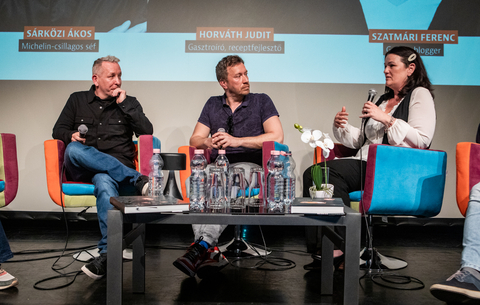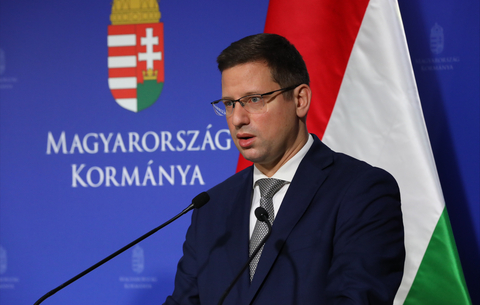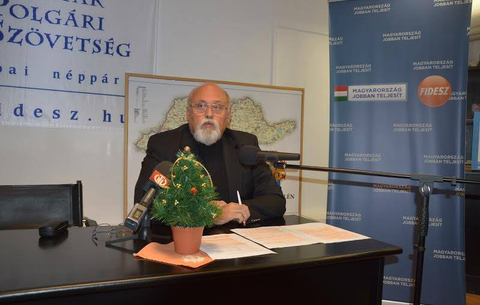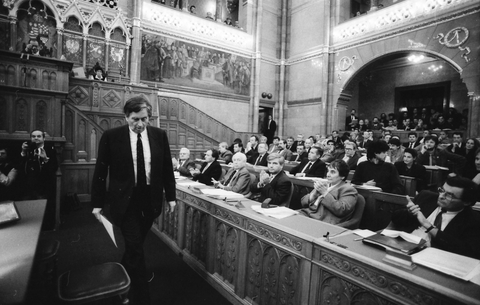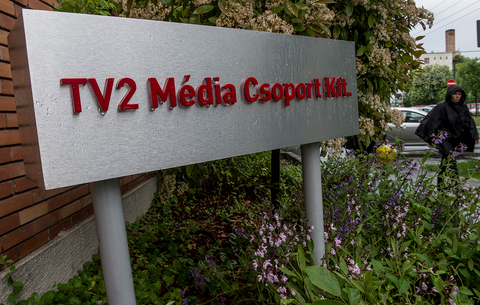Arpad Kovacs: Reform is not the same as experimentation
We spent some Ft1,500bn on economic development every year, but it's not doing us much good. And with economic uncertainty driving up the cost of credit, the burden is set to grow by several hundred million more. We spoke to Arpad Kovacs, president of the State Audit Office (ASZ) about the difficult economic climate and what may still be to come.
Árpád Kovács. We spend 1500bn HUF a year and it doesn't show © Ákos Stiller |
Á.K.: In the recent past, the problem we've been dealing with is that we haven't been spending less on certain items of budget spending and there is no benefit to our spending. We spend Ft1,500bn on economic stimulus every year - but it has no effect. That's bad, because Hungary spends just one third of the European average on research and development, while the scale of our subsidies puts us near the top of the European league table. But we're still declining. The problem is with state administration. We are in a transitional state. We're trying to get rid of the old systems and adopt new administrative approaches - but it hasn't really started yet.
hvg.hu: What could we change?
Á.K.: The Audit Office thinks the quality of state administration needs to improve. We have to go back to the kind of administrative models that worked and continue to work. Reform is not about lots of experiments. If you don't have a proper model then reform programmes can easily fall apart.
hvg.hu: Why? Inertia? Irresponsibility?
Á.K.: Party politics are very dominant in Hungary. It's proven difficult to build a sustainable, long-term policy agenda out of party politics. So reform becomes more like a wrestling match. Since there is no public policy, responsibility cannot be apportioned. This exaggerated party dominance creates a situation where ideas are born in small reform workshops which are then adopted by individual party leaders. It becomes a question of personality. One example is the way we once discovered Ft300m worth of unread research in the Health Ministry. When we tried to find out who was responsible, it turned out that the people who had commissioned the research were no longer in the same position six months later - and not only because there had been a government change. These kinds of management issues cause huge redundancy of the kind that no state budget in the world could deal with.
hvg.hu: Andras Simor recently said state spending should be cut by Ft2000-2500bn. How could cuts like this be made?
Á.K.: To give you a sense of the scale, the number Mr Simor cited is twice the size of our debt servicing, or about the same size as the entire budget of the local authority system. You can't take that kind of sum away from the population and from entrepreneurs in one go. At the same time, it's clear that you have to spend money when things are so unstable. Officials keep moving around, steps are taken which haven't been thought through, programmes are abandoned mid-run, and money is spent on reactivating old programmes. The audit office has tried to calculate the costs of contradictory or abandoned programmes, and we've realised that a huge amount of money could be saved if policy programmes were designed more coherently for the long term.
hvg.hu: Uncertainty has its costs. How much more difficult has it made things for us?
Á.K.: The state finances its debts by issuing sovereign bonds. It's clear that if there is uncertainty surrounding those bonds it becomes much harder to manage the public debt. If one of the major rating agencies downgrades us, that will eventually have an effect on interest rates. The national bank will be forced to raise interest rates to deal with inflation, and this also has its effect on the budget. In this way, the burden on us grows by many hundreds of billions of forints. The coalition crisis has real financial consequences.
hvg.hu: There's a growing sense of urgency about the need for change. There have been reports demanding it for years, and supposedly the political elite agrees - but nothing ever seems to happen. Why?
Á.K.: Because short-term political interests are not in harmony with long-term interests.
hvg.hu: Is there any way of bringing these two into sync?
© Ákos Stiller |
hvg.hu: You've said several times that society needs to be prepared for difficult times to come. Given the tense situation we're in now, isn't a comment like that likely to prove the last straw?
Á.K.: I don't know how far we can go, but this harmonisation process has to be explained to people - and it's for the economic and political elite to bring about the necessary changes while paying close attention to the amount of suffering people aer prepared to put up with.
hvg.hu: Isn't it already too late?
Á.K.: It's never too late.
hvg.hu: Some forecast that the Hungarian economy could pull out of this trough by the end of the year. Do you not share this opinion?
Á.K.: The audit office forecasts growth of 1 to 1.5 per cent less than the government's own unofficial figures. I'm not proud that the audit office's forecast looks set to come true. The PM asked us to comment on the convergence programme. We said nominal, fiscal tightening could be kept up for one or two years, meaning the budget could be stabilised by 2007-08. But programmes that would set the real economy moving are delayed. That's why we don't dare to say that the economy will speed up in 2009-10 after the cuts, creating a surplus. We expect the belt-tightening to last for longer - depending on how quickly we can take joint decisions.
hvg.hu: You've emphasised that something must be done about tax on wages since they are very high. Do you have a concrete proposal for how this could be implemented?
© Ákos Stiller |
hvg.hu: You said there was five-party agreement on a public finance law and that work was still continuing despite the political crisis. How much progress has been made?
Á.K.: We have drafted regulations that improve budget planning. We have a draft law regulating the financing of institutions. I believe this law has been sent to Parliament for debate. Everyone agrees that some kind of macroeconomic planning organisation is needed. We are doing everything that can technically be done. We are trying to build breaks into fiscal planning on a consensual basis.
hvg.hu: Some say corruption is widespread in Hungary. How serious are things?
Á.K.: There are two kinds of phenomena here. There are games with corruption - accusing other people of being corrupt. This has become a commercial and political tool. It's led to a situation where the whole of society is regarded as being corrupt. The other phenomenon can be seen at the local authority level. Local authorities behave like company directors, which bears its own risks with respect to corruption. Despite that, Transparency International regards Hungary as one of the better countries in this respect - so things are not hopeless. Reforming party finance would probably have a positive effect. But there are things that cannot be solved by administrative measures. The solution is a normal, transparent system of incentives.
Zsuzsanna Szabó
